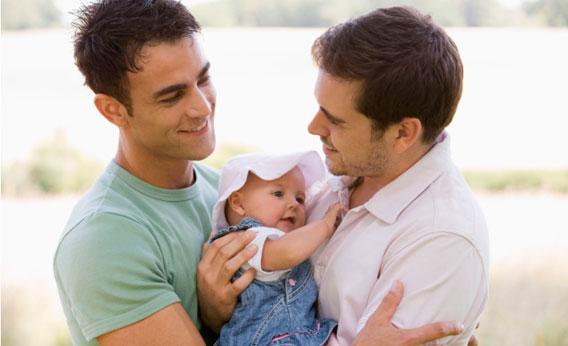Last week, Slate published an article by Mark Regnerus about his study of parents who had same-sex romantic relationships. According to Regnerus, the study shows different (and generally worse) outcomes for children whose parents engaged in such relationships, compared to adults who lived with their married, biological parents throughout childhood. Slate also published a critique of the study—and a defense of the data—by William Saletan.
Both writers had more to say, and they agreed to continue the exchange here. What follows is the fourth part of their dialogue.
Hi, Mark. I appreciate your willingness to engage questions about this study. At this point in the conversation, here’s where I think we are on the central issues.
1. Does the New Family Structures Study show any difference in child outcomes between IBFs (intact biological families) and same-sex households of similar duration? No. To the extent that the NFSS found a pattern of worse outcomes among children of “lesbian mothers” compared to children of IBFs, the “lesbian mother” group actually consisted mostly of kids who, by your account, had spent less than “a good share of a year or more” living with a mom and her lesbian partner. The most common age at which kids reported living with a mom and her partner was 14, so it’s unclear what kind of family structure these kids grew up in from birth to age 13. As you note, the two cases in which you found same-sex couples that stayed together for all 18 years of the child’s upbringing weren’t enough to generate statistically valid comparisons. To the extent that you found a pattern among the six kids who had lived with a mom and her lesbian partner for at least 13 years, the pattern was that those kids “fared better on more outcomes than did their less-stable peers.”
2. Does the NFSS show that gay parents, per se, are more prone to unstable relationships than straight parents are? No. Because the study excluded any respondent who was younger than 18 as of February 2012, all the kids in the sample were born between 1971 and 1994. During this time, gay sex was illegal in many states, and gay marriage was illegal everywhere. Formal commitment between same-sex partners was unsupported, discouraged, and impeded. To separate inherent propensities from such environmental factors, we’d have to compare the NFSS data to studies of kids raised in a culture and legal system more accepting of same-sex commitments.
3. Does the NFSS provide a more statistically valid sample of same-sex households than prior studies have offered? No. What the NFSS targeted and yielded was a representative sample of adults who said that at least one of their parents had, at some point during the respondent’s childhood, engaged in a same-sex romantic relationship. Within this sample, the number of respondents who were raised in same-sex households for five years or more (18) was smaller than the samples used in all but a handful of the 59 prior studies that purportedly indicated “no difference” between gay and straight parenting. This makes the NFSS subsample technically more representative, but statistically meaningless.
The more statistically meaningful the NFSS subsample becomes, through the addition of cases in which a child actually spent very little time in a same-sex household, the less it represents parenting by same-sex couples. We end up with a bunch of “no difference” samples from prior studies, skewed by education and socioeconomic status, versus an NFSS sample skewed by a focus on relationship behavior rather than family structure. Which of these biases skews the data more? We simply don’t know.
4. Does the NFSS shift the burden of proof to those who claim “no difference”? You argue that it does, based on the size and randomness of your sample, combined with the known effects of instability in studies of adoption and stepfamilies. But both of your arguments are confounded by other factors. The randomness of the NFSS sample is confounded by its selection for parents who had a same-sex relationship, rather than for parents who raised their kids in a same-sex household for any serious length of time. And the fact that all same-sex households with children are either adoptive families or stepfamilies is confounded by the fact that same-sex couples don’t produce children accidentally. To what degree does the better ratio of planned parenthood among gay couples, compared to straight couples, cancel out the effects of substituting a same-sex stepparent or adoptive parent for one of the child’s biological parents? Again, we just don’t know.
You undertook this study to test the “no difference” hypothesis. From what you and the study’s funders have written, it’s pretty clear that both you and they expected the study to falsify that hypothesis. You’ve emerged claiming that it did so. But the data you’ve found here do more than that. They challenge you to reconsider what “no difference” means. Does it mean no difference between gay and straight parents? Or does it mean no difference among family structures generally? Is it possible that the second version is false, but the first, on balance, is true? That kids tend to do best when they grow up with their biological, married parents, but that same-sex couples who replicate this stability produce essentially the same outcomes as, say, a straight couple that uses egg or sperm donation to overcome one partner’s infertility?
The NFSS, with its preconceived focus on comparing IBFs to parents who had gay relationships—that is, comparing a structure to an orientation—seems designed to conflate the two questions. Unlike your harsher critics, I think this conflation was a blind spot, not a strategy. If I’m right, the data you’ve found and the substantive criticisms you’ve heard, including in this conversation, will affect the way you think and talk about this difficult topic. Have they changed your mind in any way? Have they made you rethink anything?
Will
